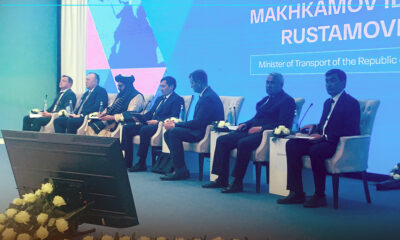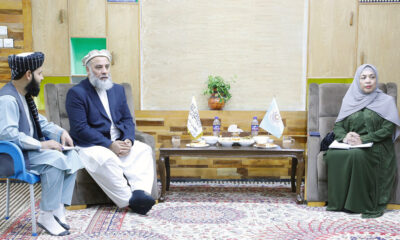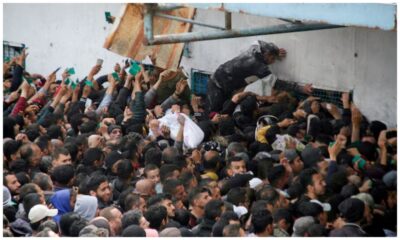Latest News
Iran President says insecurity will return to Afghanistan if inclusive govt not formed
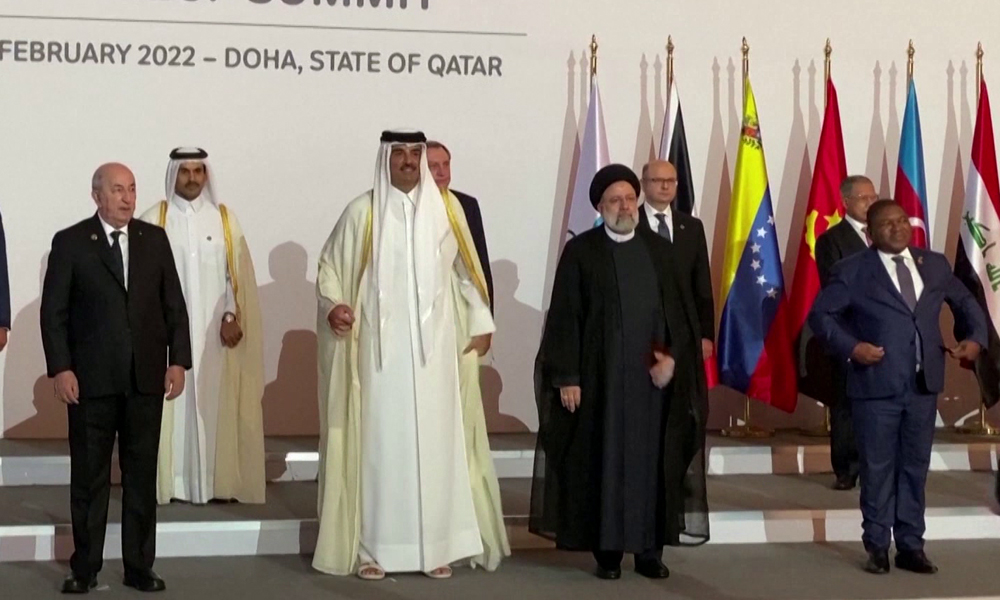
During a meeting with the Emir of Qatar Sheikh Tamim bin Hamad Al Thani, the Iranian President Ebrahim Raisi said that his neighbors should help form an inclusive government in Afghanistan, otherwise the country will become insecure.
Raisi who was on a visit to Qatar, said at a joint press conference with Sheikh Tamim bin Hamad Al Thani that in the absence of such a government, unrest in Afghanistan would continue.
“Afghanistan’s neighbors and countries in the region must help the people and all ethnic and political groups of Afghanistan to establish an all-inclusive popular government in Afghanistan, otherwise insecurity will return to this oppressed country,” Raisi said.
The Iranian president also said he had talked with the Emir of Qatar about regional issues, the fight against terrorism, and narcotics.
“We also exchanged views on regional issues such as the fight against terrorism, the situation in Afghanistan, drug trafficking, and agreed that the fight against terrorism and its various forms is one of our priorities. Iran’s capabilities in the successful fight against terrorism in Syria and Iraq are security-building not only for the region but also for the world,” Raisi said.
The UN Secretary-General Antonio Guterres said recently that a single-ethnic government would not solve the current problems of the Afghan people.
Meanwhile, Russia, a country heavily embroiled in tensions with the West over the Ukraine crisis, favors the formation of a participatory government in which all prominent Afghan political actors are involved.
“There is no talk of Russia recognizing the new government. Moscow is in favor of participatory leadership in Afghanistan with the participation of all major political groups, and it supports such a government,” said Russian Deputy Foreign Minister and Special Presidential Representative for the Middle East and Africa Mikhail Bogdanov.
The Islamic Emirate considers the caretaker government to be inclusive and has repeatedly emphasized that it has representatives of other ethnic groups and strata of Afghanistan and has also promised to reform the structure of the caretaker cabinet.
Latest News
Over 1,000 Afghan refugees forced out of Pakistan in one day

The Ministry of Refugees and Repatriations (MoRR) says over 1,000 Afghan migrants were forcibly returned from Pakistan on Tuesday through Spin Boldak border crossing in Kandahar province, the ministry said in a statement.
The ministry stated that based on information provided by the Spin Boldak Kandahar border command, these returnees comprised 191 families, totalling 998 people.
In addition, three migrants released from Pakistani prisons were also returned, according to the statement.
The statement added that after registering the returnees, the refugees were referred to the offices of the International Organization for Migration (IOM), the World Food Program (WFP) and the United Nations High Commissioner for Refugees (UNHCR).
Each family received 10,000 afghanis – paid to them by the Islamic Emirate.
In another statement, the ministry said that 2,783 migrants living in Iran voluntarily and forcibly returned to the country during this week.
Latest News
Afghanistan’s minister of transport and aviation attends regional meeting in Uzbekistan

Hamidullah Akhundzadeh, acting Minister of Transport and Aviation, headed a delegation to Uzbekistan for a ‘Six-Party Corridor’ meeting that included representatives from Afghanistan, Russia, Belarus, Pakistan, Kazakhstan and Uzbekistan.
On the sidelines of this meeting the Afghanistan delegation discussed trade through the corridor with the other five relevant countries.
According to the ministry of transport and aviation, Akhundzadeh met with the deputy ministers of transport of Russia and Belarus.
He also discussed ways to expand transit between Afghanistan and Russia; and Afghanistan and Belarus, and provide the necessary facilities to achieve this.
The ministry added that the acting minister had a bilateral meeting with the Minister of Transport and the Special Representative of the President of Uzbekistan on Afghanistan and discussed the expansion of road transport between the two countries.
Latest News
Malaysian delegation arrives in Kabul for talks with government
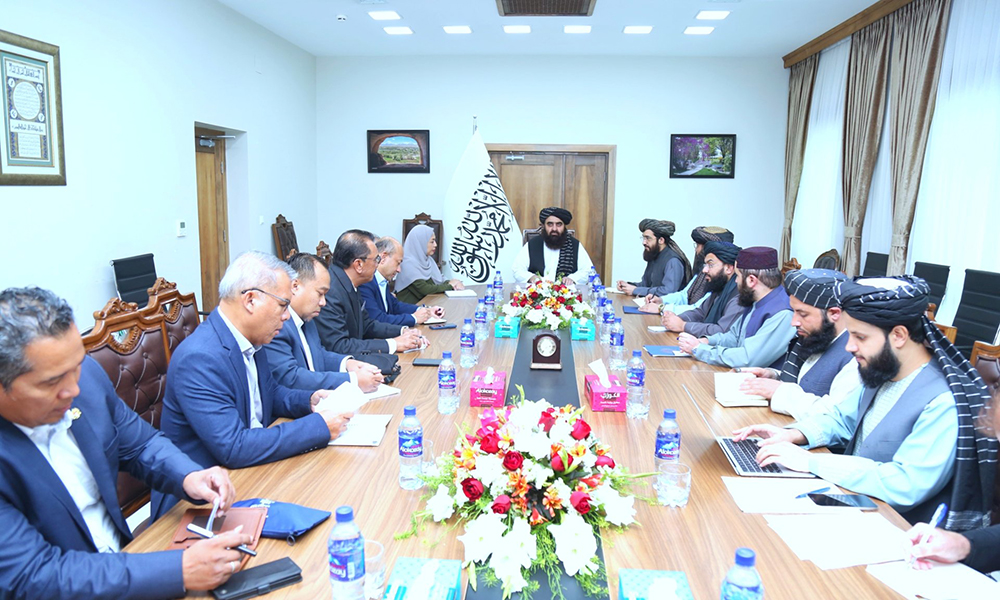
Representatives of Malaysia’s ministries of foreign affairs, defense and interior and advisors of the Malaysian Prime Minister and the Special Representative of Malaysia for Afghanistan arrived in Kabul this week for meetings with a number of high-ranking officials.
The Islamic Emirate’s foreign minister Mawlavi Amir Khan Muttaqi met with the delegation and thanked Malaysia for assistance it has provided over the past few years, including aid for the victims of the deadly Herat earthquake.
Muttaqi said in the meeting that existing diplomatic, religious, cultural and economic relations between the people and governments of Afghanistan and Malaysia were expanding.
“There are business and investment opportunities in various fields,” Muttaqi told the delegation.
“Afghanistan follows a balanced and economy-oriented foreign policy in the political and economic field. Afghanistan’s relations with the international community are expanding and it has established good relations with neighboring and regional countries,” said Muttaqi.
Afghanistan is keen to expand its relations with the countries of Southeast Asia, he added.
Muttaqi further said: “The Afghan government wants the Malaysian government to provide health and education facilities for the 3,000 Afghans currently living in Malaysia.”
At the same time, members of the Malaysian delegation said that the Malaysian government wants to expand relations with Afghanistan in various fields.
The delegation positively evaluated the political situation in Afghanistan and said they hoped a Malaysian trade delegation would visit Afghanistan in the near future.
One delegate, Dato Shazlina said: “Malaysia is determined to organize short-term training programs for Afghan diplomats, training programs in the field of information technology, accounting and development for Afghan civil service employees and in this regard cooperate with Afghanistan in organizing professional programs.”
The political deputy prime minister, Mawlavi Abdul Kabir, also met with the delegation and said the Islamic Emirate has achieved much in the economic and political sectors, and that the world, including the region, has no need to be concerned about Afghanistan.
-

 Sport4 days ago
Sport4 days agoAfghanistan Champions League kicks off with grand opening ceremony
-

 Latest News3 days ago
Latest News3 days agoPakistan’s frontiers minister stresses ‘dignified’ return of Afghan refugees
-

 Regional5 days ago
Regional5 days agoIran’s foreign minister downplays drone attack, says Tehran investigating
-

 Business4 days ago
Business4 days agoAfghanistan’s economic prospects are bleak: World Bank
-

 Latest News4 days ago
Latest News4 days agoMore than 800 Afghan refugees deported from Pakistan in two days
-

 Regional2 days ago
Regional2 days agoIranian president lands in Pakistan for three-day visit to mend ties
-

 Climate Change3 days ago
Climate Change3 days agoMassive river flooding expected in China, threatening millions
-

 Latest News4 days ago
Latest News4 days agoChinese keen to invest in Panjshir-Kabul water conduit project




